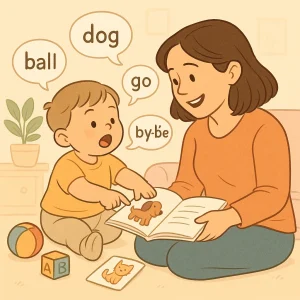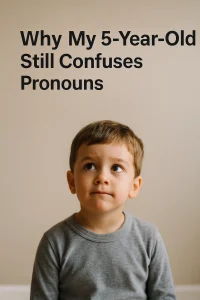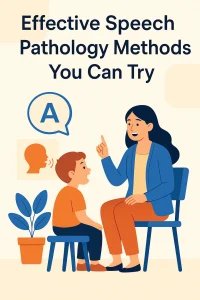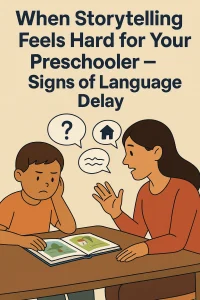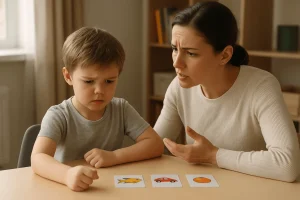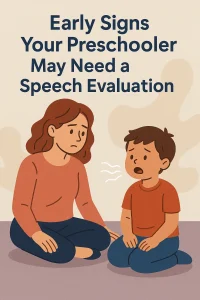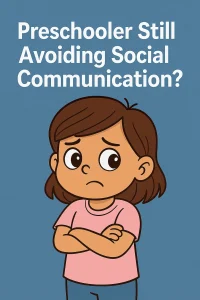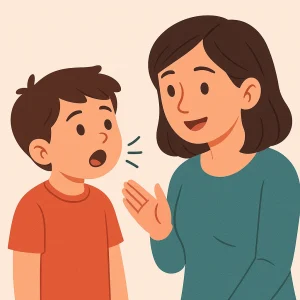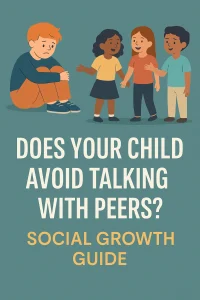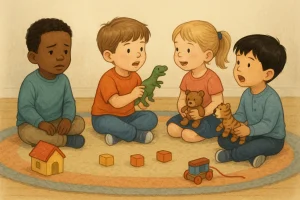How Many Words Should a 2-Year-Old Say? A Parent’s Guide
Last Updated: August 7, 2025
Is your toddler two and not saying as many words as other kids? Maybe you’re just wondering what’s considered “normal” at this age. If so, you’re not alone—many parents ask the same thing. Typically, around age 2, speech starts to take off. However, every child grows at their own pace, and some may experience a speech delay in toddlers, which can be perfectly normal or may need a little extra support. In this article, we’ll break down how many words a 2-year-old typically says, what kinds of words to expect, and how you can gently support your child’s growing vocabulary at home. Whether your child is saying 20 words or 200, you’ll find helpful, expert-backed tips to guide you forward.
Free Speech Help for Kids
Concerned about speech delays? Book a free consultation with our expert speech therapist and get guidance tailored to your child’s needs.
What’s the Typical Word Count for a 2-Year-Old?
By the time your toddler turns 2, you might be wondering: “Is my child saying enough words?” You’re not alone—this is one of the most common questions parents ask during early development.
On average, a 2-year-old will say around 50 to 100 words. Some children may even use more than 100 words, while others might be just starting to build their vocabulary. Both can be perfectly normal, depending on how your child communicates and connects with the world.
What’s more important than just the number? It’s the growth in language skills. By this age, toddlers typically begin to:
- Label familiar people or objects (“mama,” “dog,” “milk”)
- Ask for things using simple words
- Use two-word combinations like:
- “Want toy”
- “Go park”
- “More juice”
- “No bed”
Here’s a quick reference table of vocabulary expectations at age 2:
| Age Range | Vocabulary Size | Language Milestones |
|---|---|---|
| 18–24 months | ~10 to 50 words | Single-word requests, names, and pointing |
| 24 months (age 2) | 50 to 100+ words | Two-word phrases, more consistent speech use |
| After 2 | Vocabulary grows rapidly | Short phrases, learning new words daily |
You may also notice your child trying out new words each day—this is often called a “word explosion” and usually happens between 18–30 months.
Remember: kids don’t need to speak perfectly at this age. Pronunciation might still be unclear, and that’s okay. As long as your child is attempting to communicate, learning new words, and responding to others, they’re moving in the right direction.
Read more: How Many Words Should Your 2-Year-Old Know?
What Types of Words Do Toddlers Usually Say at This Age?
By the time your child turns 2, you’ll likely start hearing more variety in the words they use. It’s not just about how many words—they’re also beginning to express what they see, feel, and need using simple vocabulary. However, if you’re noticing fewer words or limited variety, it could be an early sign of a speech delay. So, what words should a 2-year-old be saying? Let’s break it down.
Common Word Categories in a 2-Year-Old’s Speech
Most toddlers’ vocabulary falls into a few key types:
- People:
Words like “mama,” “dada,” or names of siblings and grandparents - Things:
Everyday objects like “ball,” “car,” “cup,” “water,” “shoes” - Actions:
Words like “go,” “eat,” “come,” “sleep,” and “play” help them ask or tell what they want - Social Words:
These include “hi,” “bye,” “no,” “yes,” “more,” and “please” — often used during routines or mealtimes
As your child grows, they may also start using descriptive words (like “big,” “hot,” “yummy”) and sound effects (like “vroom,” “woof”) which are all important parts of early speech development.
Tip: Use these categories during play or mealtime. For example, “You’re playing with the car. The car goes vroom!” This kind of repetition helps toddlers lock in new words faster.
How Clear Should Their Words Be?
It’s totally normal if your child’s speech isn’t crystal clear yet. At age 2:
- They might drop sounds or say part of the word (e.g., “wa” for “water”)
- Words might sound muddled or cute—and that’s okay
- The goal is for you, as a parent, to understand them about 50% of the time
What matters most is variety and effort, not perfect speech. If they’re using different types of words and trying to communicate, they’re right on track.
Speech clarity improves with time, practice, and interaction. Reading books, naming items, and having little conversations throughout the day go a long way.
How Vocabulary Grows Around Age Two
By the time your child turns 2, you’ll likely start hearing more variety in the words they use. It’s not just about how many words—they’re also beginning to express what they see, feel, and need using simple vocabulary. However, if your toddler is using only a few words or repeating the same ones without much variety, it might be worth considering the possibility of a speech delay. Early signs can be subtle, but recognizing them helps you take supportive steps sooner. So, what words should a 2-year-old be saying? Let’s break it down.
You might even notice new words popping up almost daily!
Here’s what that language growth often looks like around this age:
- From single words to short phrases
- Using words more intentionally to ask, tell, or respond
- Trying to imitate what they hear from parents, books, or songs
- Combining words like “more juice,” “mama come,” or “all done”
Simple Ways to Boost Your Toddler’s Vocabulary Growth
(Feel free to use this list as part of your daily routine!)
- Talk through your day: Describe what you’re doing (“I’m washing your cup”)
- Pause and wait: Give your child a moment to respond or fill in a word
- Use the same words often: Toddlers learn through repetition
- Read picture books: Even 5 minutes a day makes a difference
- Sing together: Songs help build rhythm and memory for words
The more your toddler hears and uses words in real-life situations, the more they begin to understand how language works.
What If My Child Knows Fewer Words? Should I Be Worried?
It’s natural to wonder how your child stacks up compared to others. Maybe a friend’s toddler is already chatting away, while your little one is using only a handful of words. However, here’s the honest truth: every child develops at their own pace — and that’s okay. In some cases, fewer spoken words may simply be part of normal variation, but it can also be an early sign of a speech delay. Recognizing the signs early allows you to support your child’s communication growth in the best possible way.
Some toddlers talk earlier, while others take a bit more time. More importantly, what matters is observing steady progress. For example, are they trying to say new words? Are they using gestures, showing interest, and listening when you speak? These are all signs of healthy communication growth. However, if you’re not noticing these developments or if progress seems to have stalled, it could point to a speech delay—and identifying it early allows you to give your child the right support at the right time.
Instead of worrying, try focusing on encouraging more interaction throughout the day. Even simple things, like talking about what you’re doing, playing face-to-face, and reading books, can gently boost your child’s vocabulary over time. These small daily efforts are especially helpful if you’re concerned about a possible speech delay, as early and consistent interaction plays a key role in supporting language development.
Even so, if you still feel unsure, you don’t have to figure it out alone.
How You Can Help Your Child Learn More Words
If you’re wondering how to help your 2-year-old talk more, the good news is—you don’t need fancy tools or special training. In fact, the best language lessons happen right at home, during your normal day-to-day routines. And if you’re concerned about a possible speech delay, these simple, consistent interactions can make a big difference in encouraging your child’s communication skills.
With a few simple tweaks to how you talk and play, you can gently boost your child’s vocabulary and help them feel more confident using their words.
Easy Everyday Ways to Add Words
These speech tips for toddlers fit right into your daily routine:
- Name things during play or meals:
“Here’s your spoon. Let’s stir the soup. Hot soup!” Repeating words during familiar activities helps toddlers connect words to meaning. - Talk about what you’re doing:
Think out loud during small tasks like brushing hair, packing a bag, or washing hands. “Mama is putting on your shoes. One shoe, two shoes!” - Repeat and expand on what your child says:
If they say “ball,” you can say “Yes, red ball!” or “You want the big ball?” This teaches new words while validating their effort to speak. - Use picture books and daily routines:
Reading the same book over and over might feel boring to you—but repetition is powerful for kids. Choose books with simple, repeating lines and clear pictures.
These strategies may seem small, but they add up over time. Every word your child hears, sees, or tries to say builds their language skills.
Conclusion
By age 2, most toddlers say 50 to 100 words; however, every child is different. While some speak early, others take a little more time. What matters most, though, is steady growth and regular, everyday interaction. That’s why it’s important to talk to your child often, name the things around them, and enjoy even the smallest conversations. If you’re concerned about a possible speech delay, these simple daily interactions can be incredibly valuable in supporting your child’s language development. After all, every word they say is a big step forward.
If at any point you feel unsure, you don’t have to wait or guess. Instead, you can turn to Wellness Hub. Through our expert-backed BASICS program, we offer simple speech support—specifically designed for parents like you.
Frequently Asked questions:
1. How many words should a 2-year-old say?
Most 2-year-olds say around 50 to 100 words. Some may say less or more—both can be okay. What matters is that their word use is growing over time. If you’re unsure, talking to a speech expert can help.
2. What kind of words should a 2-year-old be saying?
Toddlers usually say words like “mama,” “ball,” “go,” and “bye.” These include names, toys, actions, and common needs. At this age, children learn best through repetition and daily routines. Speak clearly and name things often.
3. Is it normal if my 2-year-old doesn’t talk much?
Some children are quiet talkers in the early years. As long as they try to communicate and understand simple words, they may still be developing normally. Look for signs of steady improvement over weeks and months. If not, gentle speech support can help.
4. Should a 2-year-old be putting words together?
Yes, most 2-year-olds start using two-word phrases like “want milk” or “go out.” This shows their brain is connecting ideas with language. If they aren’t doing this yet, model short phrases often. For example, say “big ball” when playing together.
5. What helps a 2-year-old learn more words?
Talking, reading, and playing together help toddlers grow their vocabulary. Name things clearly and talk about what you’re doing. Repeating words during meals, bath time, or walks helps a lot. Make it fun and part of everyday life.
6. How clear should a 2-year-old’s speech be?
It’s normal if many words sound unclear at this stage. Parents usually understand about half of what their child says. Toddlers are still learning how to form sounds. Focus on what they mean, not how perfect it sounds.
7. When should I worry about a speech delay?
If your 2-year-old says fewer than 20 words, doesn’t combine words, or doesn’t respond to you, it’s a good time to check in. Early help makes a big difference. You can talk to a speech-language therapist or use a home-based support program. Don’t wait—early action helps.
8. Does reading help with toddler speech?
Yes, reading is one of the best ways to build your child’s speech. Simple picture books with repeating lines are great for learning. Reading helps your child hear how words sound and how they’re used. Even a few minutes a day makes a difference.
9. Can I help my toddler talk more at home?
Absolutely! Use short sentences and talk often during daily routines. Repeat what they say and gently add more words. Singing songs, playing pretend games, and asking questions also help. Make speech part of your everyday play.
10. Where can I get support for my toddler’s speech development?
You can get help through trusted programs like the BASICS Speech Program from Wellness Hub. It gives you expert support in a simple, parent-friendly way. You’ll learn how to encourage speech during daily activities. Start at home and go at your child’s pace.
About the Author:
Shravanaveena Gajula
M.Sc ., Speech and Language Pathology (5+ years of experience)
Shravanaveena Gajula is a dedicated Speech-Language Pathologist with a BASLP and an M.Sc in Speech and Language Pathology. With experience spanning multiple settings, including Wellness Hub , Veena specializes in a wide range of disorders from developmental issues in children to speech and language assessments in adults. Her expertise includes parent counseling, managing speech sound and fluency disorders, and creating individualized therapy programs. Veena is also PROMPT certified and an author of several insightful blogs on speech and language pathology, aiming to educate and assist caregivers in supporting their loved ones.
Book your Free Consultation Today
Parent/Caregiver Info:
Client’s Details:
* Error Message
